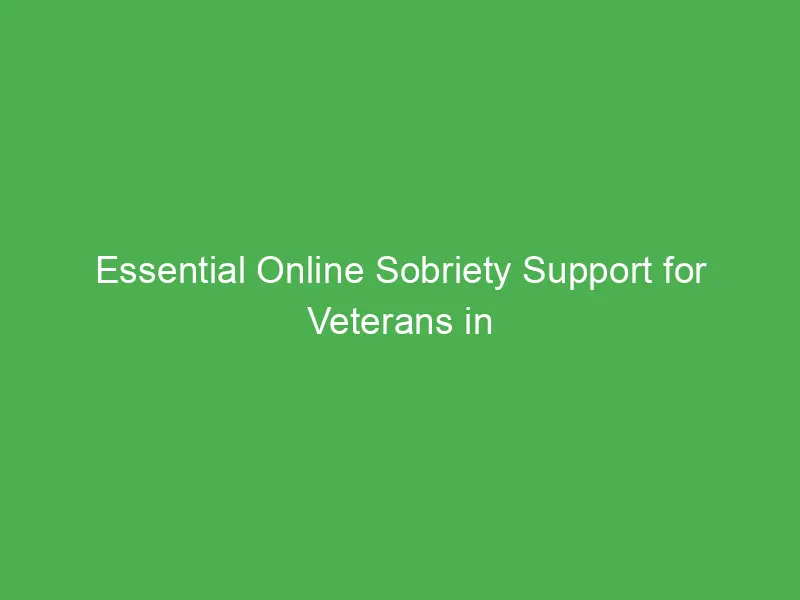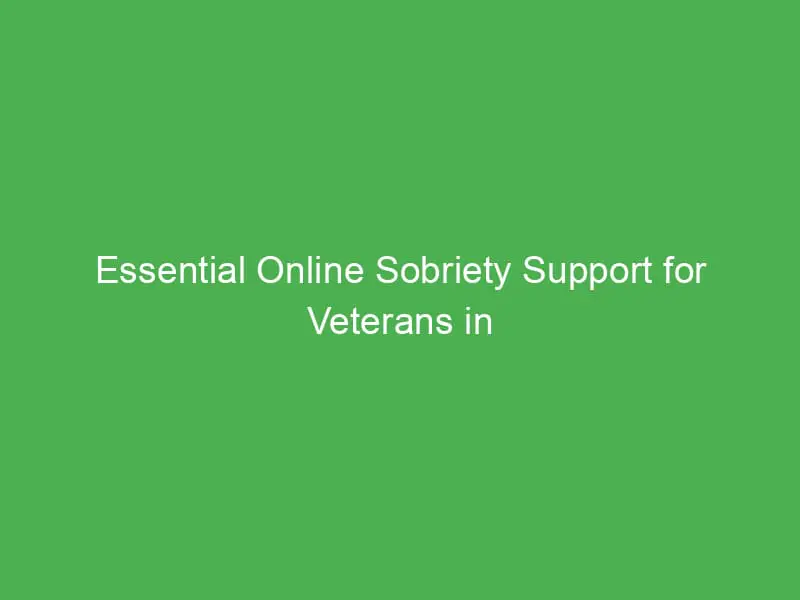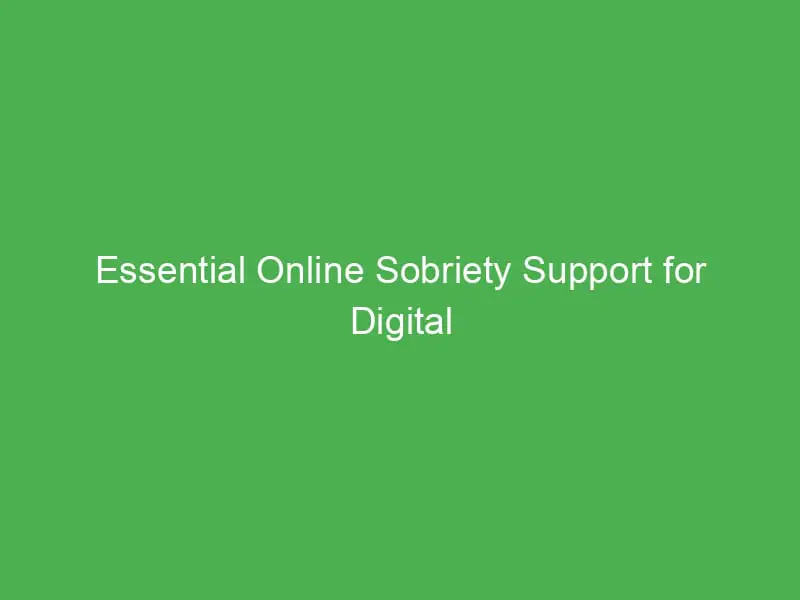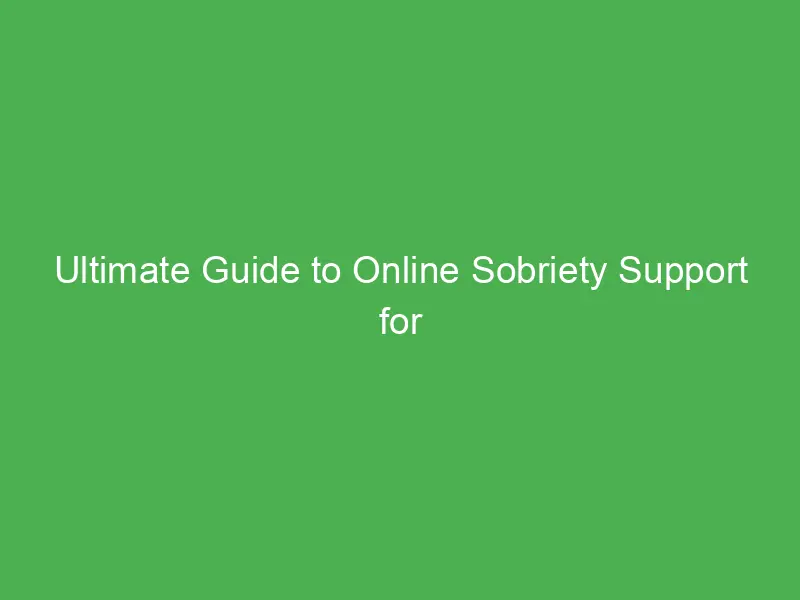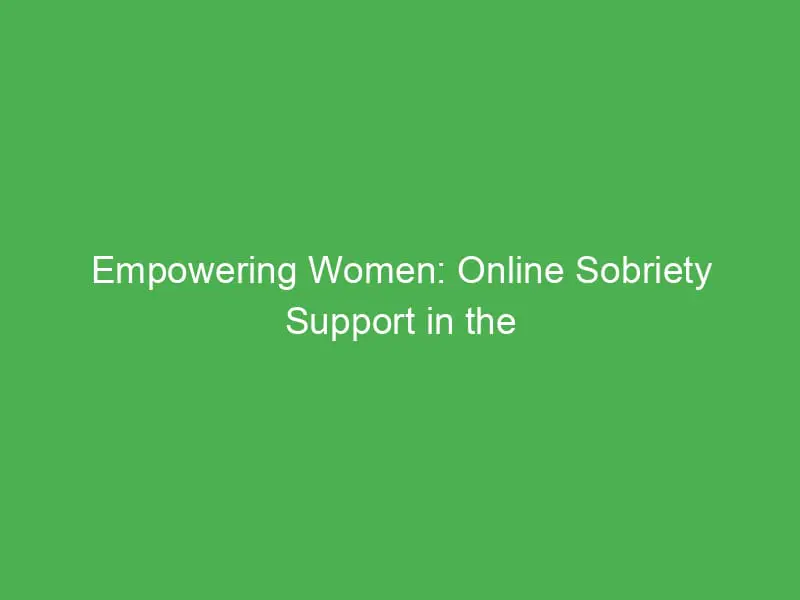Veterans in Canada face unique challenges when it comes to maintaining sobriety, often grappling with the effects of trauma and isolation. Online sobriety support has emerged as a vital resource, offering accessible and tailored help for those who’ve served their country. With the rise of digital platforms, veterans can connect with peers, share experiences, and access professional guidance from the comfort of their homes.
These online communities provide a safe space for veterans to seek support without the stigma that sometimes accompanies traditional recovery settings. From virtual meetings to dedicated forums, the options available empower individuals to take charge of their sobriety journey, fostering resilience and camaraderie among those who understand the struggles. In a vast country like Canada, this digital support network is not just beneficial; it’s essential for promoting lasting recovery and well-being.
• What is online sobriety support for veterans in Canada?
Online sobriety support for veterans in Canada refers to digital platforms that offer resources, community, and professional assistance aimed at helping veterans overcome substance use challenges. These platforms are tailored to address the unique needs of veterans, acknowledging their experiences with trauma, mental health issues, and the potential for social isolation.
Key Components of Online Sobriety Support
- Peer Support Groups
Online communities allow veterans to connect with others who share similar experiences. These groups provide a safe space for sharing struggles and successes, fostering a sense of belonging and understanding.
- Professional Resources
Access to trained professionals through virtual therapy sessions, workshops, and webinars is integral. Veterans can seek guidance from addiction specialists, therapists, and clinicians who understand military culture.
- Educational Materials
Many platforms offer articles, videos, and podcasts focused on sobriety and mental health topics. These resources help veterans learn coping strategies, relapse prevention techniques, and self-care practices.
- 24/7 Accessibility
The convenience of accessing support anytime and anywhere makes it easier for veterans to seek assistance when they need it most. This flexibility is crucial in maintaining sobriety, especially during challenging times.
- Anonymity and Privacy
Online platforms often allow veterans to participate anonymously, reducing the stigma associated with seeking help. This aspect encourages more individuals to engage with resources they might otherwise avoid.
- Customised Programs
Many services provide tailored recovery plans that consider individual needs and circumstances. Personalised approaches increase the likelihood of successful outcomes in sobriety journeys.
These aspects of online sobriety support create a comprehensive framework for veterans, helping them build resilience, regain control, and foster long-term sobriety outcomes.
• Benefits of online sobriety support for veterans in Canada
- Accessibility: Online sobriety support provides veterans in Canada with 24/7 access to resources, ensuring help is available whenever it’s needed. This is especially important for those who may struggle to attend in-person meetings due to geographical or physical limitations.
- Anonymity: Many online platforms offer a level of anonymity, encouraging veterans to seek help without the fear of judgement. This stigma-free environment fosters openness and honesty, which are crucial for recovery.
- Peer Support: Online groups connect veterans with others who share similar experiences. This camaraderie creates a sense of belonging and reduces feelings of isolation, making it easier for individuals to discuss their challenges and successes.
- Professional Guidance: Access to trained professionals through virtual therapy or online workshops allows veterans to obtain tailored advice and coping strategies. Professional intervention can help individuals navigate their sobriety journey more effectively.
- Flexible Scheduling: Online support services often offer flexible meeting times, making it easier for veterans to fit support into their busy lives. This adaptability increases engagement and commitment to recovery efforts.
- Customised Recovery Plans: Many online platforms provide personalised recovery plans based on individual needs. These tailored approaches enhance the likelihood of successful sobriety outcomes by addressing unique challenges.
- Educational Resources: Online sobriety support offers access to a wealth of educational materials, including coping strategies and self-care practices. This knowledge equips veterans with tools to manage cravings and stressors, promoting sustained recovery.
- Community Building: Participating in online sobriety groups helps veterans build a supportive network. This sense of community encourages individuals to stay accountable and share their triumphs, reinforcing positive behaviour.
- Reduced Travel Time and Costs: Online support eliminates the need for travel, saving both time and money. This convenience allows veterans to focus more on their recovery rather than logistical concerns.
- Diverse Options: Various platforms cater to different needs, offering everything from group discussions to specialised workshops, ensuring that veterans find the right fit for their recovery journey.
• How to Find the Best online sobriety support for veterans in Canada
- Research Available Platforms
Search for dedicated online sobriety support platforms specifically tailored for veterans in Canada. Websites like Veterans Affairs Canada (VAC) and Canadian Veterans Affairs’ resources can provide links to appropriate services.
- Evaluate Peer Support Groups
Assess peer support groups that focus on veterans’ experiences. Look for platforms that host moderated forums, chat rooms, or video calls, allowing veterans to share their stories and support one another.
- Check Professional Credentials
Review the qualifications of professionals providing support on online platforms. Ensure that therapists and counsellors have relevant experience in addiction recovery and a solid background in working with veterans.
- Explore Various Formats
Consider platforms that offer diverse formats of support such as video therapy sessions, podcasts, webinars, and written resources. This variety caters to different learning styles and preferences.
- Assess Anonymity Features
Investigate how platforms ensure user anonymity. Strong privacy policies and secure methods to access support can encourage veterans to engage without fear of judgement.
- Look for Customised Recovery Plans
Opt for services that provide personalised recovery plans tailored to individual needs. Support tailored to unique circumstances enhances the chances of successful sobriety outcomes.
- Read User Reviews and Testimonials
Examine feedback from other veterans regarding their experiences with online sobriety support. Positive testimonials can indicate a platform’s effectiveness in fostering recovery.
- Consider Accessibility and Flexibility
Ensure platforms are accessible on various devices and allow flexible scheduling. This accessibility makes it easier for veterans to participate in support at their convenience.
- Utilise Educational Resources
Seek platforms that include educational materials. Resources that offer coping strategies for stress and cravings can equip veterans with the necessary tools for sustained recovery.
- Connect with Local Resources
Use online support as a complement to local services. Engaging with nearby support groups can provide additional avenues for help and community connection.
• Best Practices for online sobriety support for veterans in Canada
- Choose reputable platforms: Look for well-established online sobriety support networks specifically aimed at veterans. Verify their credentials and track record to ensure reliable assistance.
- Engage with peer support groups: Participate actively in peer-led forums and discussions. Sharing experiences with fellow veterans fosters camaraderie and reduces feelings of isolation.
- Access professional help: Utilise platforms offering trained therapists or counsellors. Virtual therapy can provide invaluable guidance and coping strategies that may not be available through peer support alone.
- Implement customised recovery plans: Opt for platforms that offer tailored recovery programmes. Individualised plans cater to specific needs and improve the chances of successful sobriety.
- Prioritise anonymity and confidentiality: Select services that ensure privacy and anonymity. This allows veterans to seek help without fear of judgment, promoting open and honest communication.
- Seek 24/7 support options: Choose resources that provide round-the-clock availability. Constant access ensures veterans can find help whenever they need it, especially during critical moments.
- Utilise educational resources: Engage with articles, videos, and workshops that focus on effective coping strategies and self-care. This knowledge equips veterans with tools to handle cravings and triggers.
- Read user testimonials: Investigate user reviews to evaluate the effectiveness of support groups and resources. Feedback from fellow veterans can guide choices and enhance trust in chosen platforms.
- Connect with local resources: Combine online support with local organisations or community groups. Building local connections can enhance the recovery journey and provide additional support networks.
- Set goals and track progress: Encourage veterans to establish achievable sobriety goals. Monitoring milestones can foster accountability and keep them motivated throughout their recovery journey.
• Common Challenges with online sobriety support for veterans in Canada
- Technology Barriers: Many veterans encounter difficulties with technology. This can manifest as limited access to reliable internet, unfamiliarity with digital platforms, or lack of devices. Addressing these barriers through community workshops or support from family can facilitate better access to online resources.
- Isolation in a Virtual Environment: While online support provides a level of anonymity, it can also exacerbate feelings of isolation. Engaging in face-to-face interactions is often preferable for establishing connections. Encouraging regular participation in virtual meetings, video calls, or local meet-ups can counteract feelings of loneliness.
- Distractions at Home: The home environment may pose distractions that hinder commitment to sobriety goals. Identifying a dedicated space for online meetings or support sessions helps minimise interruptions. Establishing boundaries with family members during these sessions can also enhance focus.
- Stigma Around Seeking Help: Despite the anonymity online platforms offer, stigma can still impede veterans from seeking support. Educating communities about the importance of mental health and sobriety is vital. Creating testimonials and success stories can help normalise seeking assistance.
- Variability in Quality of Platforms: Not all online resources are created equal, leading to confusion among veterans. Researching platform credentials, user reviews, and success rates is essential for choosing effective support options. Listing recommended platforms and resources can aid veterans in making informed decisions.
- Emotional Vulnerability: Sharing personal experiences online can make veterans feel vulnerable. They may fear judgement or may struggle with trust. To build a safer environment, moderators can ensure respectful communication practices and establish clear guidelines for group discussions.
- Lack of Accountability: Online support can lack the accountability that in-person meetings often provide. Setting personal goals and progress tracking systems helps veterans remain accountable. Using apps or journals to document achievements fosters a sense of commitment to their sobriety journey.
Key Takeaways
- Accessibility and Convenience: Online sobriety support offers 24/7 access to resources, allowing veterans to seek help whenever they need it, regardless of geographical barriers.
- Peer Connection: Virtual platforms foster a sense of community among veterans, enabling them to share experiences and reduce feelings of isolation through peer support groups.
- Professional Guidance: Access to trained professionals via virtual therapy and resources provides veterans with tailored advice and coping strategies essential for their recovery journey.
- Anonymity and Reduced Stigma: The online format allows veterans to engage in support without fear of judgement, promoting openness and a stigma-free environment.
- Customised Recovery Plans: Many platforms offer personalised recovery plans that take individual circumstances into account, increasing the likelihood of successful sobriety outcomes.
- Diverse Educational Resources: Online support provides a wealth of educational materials, including articles and videos that equip veterans with tools for sustained recovery and self-care.
• Conclusion
Online sobriety support offers Canadian veterans a vital lifeline in their journey towards recovery. By providing accessible resources and fostering a sense of community, these platforms empower veterans to confront their challenges head-on. The ability to engage anonymously and at their own pace helps reduce stigma and encourages open dialogue.
With tailored recovery plans and professional guidance readily available, veterans can take proactive steps towards lasting sobriety. Embracing these digital tools not only enhances their recovery experience but also cultivates resilience and a renewed sense of purpose. As veterans navigate their paths to well-being, online sobriety support stands as a crucial ally in their quest for a healthier, fulfilling life.
Frequently Asked Questions
What challenges do veterans in Canada face regarding sobriety?
Veterans in Canada often confront unique challenges to sobriety, primarily due to trauma and isolation. These factors can complicate their recovery journey, making it crucial for them to seek support.
How can online sobriety support help veterans?
Online sobriety support provides a stigma-free environment where veterans can connect with peers and professionals. This accessibility allows them to share experiences, receive guidance, and foster community, essential for recovery.
What are the key components of online sobriety support?
Key components include peer support groups, access to trained professionals for virtual therapy and workshops, and educational materials. These resources help veterans develop coping strategies and enhance their recovery.
Why is anonymity important in online sobriety support?
Anonymity encourages veterans to seek help without fear of judgement. It fosters open communication and enables them to share their experiences freely, which is vital for their recovery journey.
Looking for more sober travel inspiration? Find your next adventure on our Homepage.
What benefits do veterans gain from online sobriety support?
Online sobriety support offers flexibility, 24/7 accessibility, and tailored resources. This framework reduces feelings of isolation and provides essential tools for managing recovery, making it easier for veterans to engage in their healing process.
How can veterans find effective online sobriety support?
Veterans should choose reputable platforms, engage actively in peer support groups, and consult trained therapists. Prioritising anonymity and checking user testimonials can enhance the effectiveness of their recovery journey.
What common challenges might veterans encounter with online support?
Some challenges include technology barriers, feelings of isolation, distractions at home, and stigma regarding seeking help. Veterans are encouraged to research platforms and create a comfortable online space for sharing.
How can veterans maintain commitment to their sobriety online?
To ensure accountability, veterans should set achievable sobriety goals and track their progress. Engaging actively in support communities can further reinforce their commitment and motivate them throughout their recovery.

Quit drinking on 23 July 2021 after a two-day bender and swapped bars for border crossings and 12-step meetings. Three sober years, 36 countries, 113 travellers (totally dry), fuelled by street food, jelly babies, and a broken Google Maps app. Wandersober is my journal, my SEO lab, and my mission. Featured in GQ, Mirror, Evening Standard, MarketWatch, and more.
